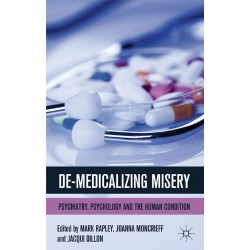Out Now: New Edition of Bestselling Book – Models of Madness
Models of Madness
Psychological, Social and Biological Approaches to Psychosis
Second Edition
Edited by John Read, University of Liverpool, UK
and Jacqui Dillon, National Chair, Hearing Voices Network, UK
“Truly, a revolution is occuring in our understanding of severe mental illness…This volume will serve as an inspiration, not only to established clinicians and researchers, but to the young people who will develop better services for people with psychosis in the future.”
– Prof Richard Bentall, From the Foreword.
“The publication is very timely given the international debate about this month’s publication of DSM-5, the latest and most controversial version of psychiatry’s diagnostic ‘bible’. Our book documents all the evidence showing that these diagnoses are unscientific and a major cause of the stigma faced by people who receive these labels. It also presents the research demonstrating the urgent need for a fundamental paradigm shift towards evidence-based, effective and humane mental health services.”
– Prof John Read, Lead Editor
Are hallucinations and delusions really symptoms of an illness called ‘schizophrenia’? Are mental health problems really caused by chemical imbalances and genetic predispositions? Are psychiatric drugs as effective and safe as the drug companies claim? Is madness preventable?
This second edition of Models of Madness challenges the simplistic, pessimistic and often damaging theories and treatments of the ‘medical model’ of madness. Psychiatric diagnoses and medications are based on the false premise that human misery and distress are casued by chemical imbalances and genetic predispositions, and ignore the social causes of psychosis and what psychiatrists call ‘schizophrenia’. This edition updates the now extensive body of research showing that hallucinations and delusions etc. are best understood as reactions to adverse life events and that psychological and social approaches to helping are more effective and far safer than psychiatric drugs and electroshock treatment. A new final chapter discusses why such a damaging ideology has come to dominate mental health and, most importantly, how to change that.
Models of Madness is divided into three sections:
- Section One provides a history of madness, including examples of violence against the ‘mentally ill’, before critiquing the theories and treatments of contemporary biological psychiatry and documenting the corrupting influence of drug companies
- Section Two summarises the research showing that hallucinations, delusions etc. are primarily caused by adverse life events (eg. parental loss, bullying, abuse and neglect in childhood, poverty, etc.) and can be understood using psychological models ranging from cognitive to psychodynamic
- Section Three presents the evidence for a range of effective psychological and social approaches to treatment, from cognitive and family therapy to primary prevention.
This book brings together thirty-seven contributors from ten countries and a wide range of scientific disciplines. It provides an evidence-based, optimistic antidote to the pessimism of biological psychiatry.
Models of Madness will be essential reading for all involved in mental health, including service users, family members, service managers, policy makers, nurses, clinical psychologists, psychiatrists, psychotherapists, counsellors, psychoanalysts, social workers, occupational therapists, and art therapists.
Download flyer to receive 20% discount from Routledge!
http://www.routledge.com/books/details/9780415579537/



 A new analysis of the hearing voices experience outside the illness model resulted in accepting and making sense of voices. This study of 50 stories forms the evidence for this successful new approach to working with voice hearers.
A new analysis of the hearing voices experience outside the illness model resulted in accepting and making sense of voices. This study of 50 stories forms the evidence for this successful new approach to working with voice hearers.